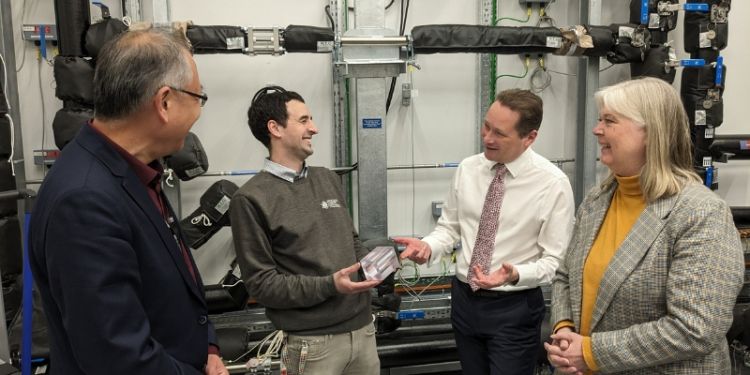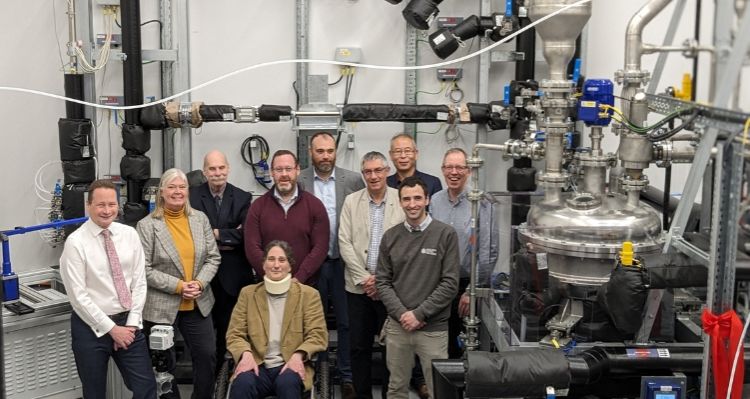Leeds to advance new-era nuclear research with pioneering MULTIform facility

The creation of a new cutting-edge facility has established the University of Leeds as the UK’s leading experimental nuclear institution in the field of multiphase fluid flow.
The only one of its kind in the country, it will help train the next generation of scientists and engineers in their bid to deliver cleaner energy and is expected to attract researchers from institutions and industries around the UK to use it.
With a molten-salt loop that can reach temperatures of up to 550C, the pilot scale test rig offers users the chance to conduct experiments with new-era nuclear technology.
The installation of this new, cutting-edge technology cements us as the UK’s leading experimental nuclear institution in this field.
Associate Professor David Harbottle, from the School of Chemical and Process Engineering at Leeds, said: “We all recognise the need to move away from fossil fuels, towards cleaner energy.
“As a zero-emission clean energy source, nuclear will be a growing part of the energy mix.
“These facilities allow us to train the next generation of scientists and engineers, conducting exciting new research that could help combat climate change, as well as supporting the growing nuclear energy sector.”
World-class nuclear facilities
MULTIForm (Multiphase Fluid Flow in Nuclear systems) will enable world-class research on multiphase fluid flow, at a scale that is representative of a real system.
The state-of-the-art equipment will support academic and industrial researchers to understand the many flow systems relevant to current and future research challenges and answer questions on themes of critical importance to the UK nuclear sector.
Housed in the School of Chemical and Process Engineering at Leeds, its top-of-the-range instrumentation will enable users to measure performances in a variety of nuclear reactors, transportation, or separation units.
It also features a pilot scale test bed, based on a water flow system, and another based on a molten-chloride flow system.
The water loop is distinctive in its capacity to work with three phases (liquid, solids and gas) and utilise acid, whereas most are single phase with pure water. It is described by the Leeds team as “probably the most sophisticated in the UK”.
The molten-salt loop is unique because it contains the largest quantity of molten salt of any such facility in the UK, meaning it can be used to conduct experiments at realistic scale.
And the window for the laser instruments in this part of the rig is made of sapphire. The precious gemstone, better known for its use in jewellery, is used because it is incredibly durable. It is second only to diamond in the hardest natural substance ratings; can withstand temperatures up to 2030C; is chemically unreactive; and has high thermal conductivity.
While there are similar facilities in a handful of places overseas, the instruments and types of experiments that can be conducted using these rigs are exclusive to Leeds.
Leading the way for the UK
Professor Bruce Hanson, Leeds’s Leadership Chair in Nuclear Process Engineering, said: “The installation of this new, cutting-edge technology cements us as the UK’s leading experimental nuclear institution in this field and enables us to play a valuable role in advancing new-era nuclear research
He added: “It’s not just cost that is a barrier to building one of these facilities. Very few institutions could do it as it requires extraordinary levels of engineering knowledge and skill.
“Our research team are world experts but there are universities that do not have that expertise, who would still want to use a facility like this, and we can support them with that.”

Image caption: Stakeholders at the launch of MULTIForm. Read the full list of names in “further information”.
The technology involved is “fourth generation” nuclear power, a new class of advanced nuclear reactors that are designed to be safer, more efficient, and more sustainable than previous generations of nuclear power plants.
The facility is not just for university staff and students but will benefit users from a range of industries and research specialisms, with the capacity to run experiments in anything from water treatment to nuclear fusion.
Professor Nora de Leeuw, Executive Dean for the Faculty of Engineering and Physical Sciences, said: “The opening of this new facility represents a significant milestone for Leeds.
“It offers an incredible opportunity to further the high level of experience and knowledge we have in this field and has the potential to accelerate innovation in nuclear research and lead to real-world impact.”
MULTIForm will support research areas including decommissioning of legacy facilities in the UK; current reactors and new build; advanced reactors and advanced fuel cycles.
Professor Nick Plant, Deputy Vice-Chancellor: Research and Innovation, said: “This fantastic and unique facility will bring together world-leading experts to advance knowledge and help solve major challenges facing the UK nuclear sector.
“The cutting-edge technology puts us at the forefront of impactful nuclear research in multiphase fluid flow and will strengthen collaboration opportunities with industry and other institutions who will also benefit from using this unique resource.”
A dedicated experimental officer is available to assist with planning, conducting and managing experiments.
The £3m facility was funded by the Engineering and Physical Sciences Research Council (EPSRC) as part of the National Nuclear User Facility (NNUF) project to provide state-of-the-art experimental facilities for research and development in nuclear science and technology.
Further information
- Top picture caption: (L to R) Sheng Dai, Professor of Chemical Engineering and Head of School of Chemical and Process Engineering (CAPE); Dr Alastair Baker, Experimental Officer for National Nuclear User Facility; Professor Nick Plant, Deputy Vice-Chancellor: Research and Innovation; Professor Nora de Leeuw, Executive Dean for the Faculty of Engineering and Physical Sciences. Credit: Gamuchirai Sibanda
- Embedded picture caption: (L to R) Professor Nick Plant, Deputy Vice-Chancellor: Research and Innovation; Professor Nora de Leeuw, Executive Dean for the Faculty of Engineering and Physical Sciences; Professor Mike Fairweather, School of Chemical and Process Engineering (CAPE); Associate Professor David Harbottle, CAPE; Associate Professor Tim Hunter, CAPE; Professor Sheng Dai, Professor of Chemical Engineering and Head of School of CAPE; Dr Darron Dixon-Hardy, Deputy Head of School of CAPE; Professor Jeff Peakall, School of Earth and Environment; (far right, front) Dr Alastair Baker, Experimental Officer for National Nuclear User Facility; (front centre) Professor Bruce Hanson, Leeds’s Leadership Chair in Nuclear Process Engineering. Credit: Gamuchirai Sibanda
- For more information on MULTIForm, contact Dr Alastair Baker via a.r.baker@leeds.ac.uk.
- Email University of Leeds press officer Deb Newman via d.newman@leeds.ac.uk with media enquiries.




